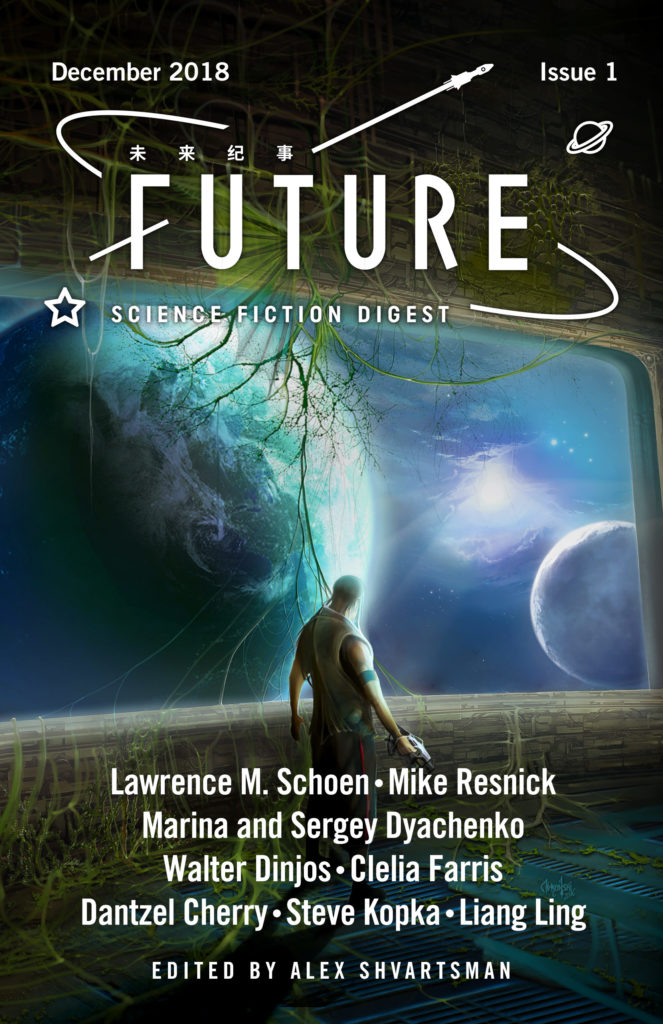Here’s a fun fact: viruses leave pieces of themselves behind. Every once in a while, bits of the DNA code they inject into captured cells to transform them into virus factories stick around after the virus itself is fought off, and sometimes that abandoned code proves beneficial to the organism it’s left in. Over time, this can build on itself, and now humans quite literally wouldn’t be what they are today without that viral legacy.
Not all viruses are built out of DNA. Sometimes they’re made of ideas and they hop from brain to brain, invading neurons to turn them into factories. One of the biggest, most influential, and most destructive mental viruses that humans have ever had to deal with is the idea of empire.
As viral code is now integral to the human genome, ideas of empire are integral to modern science fiction. It didn’t have to be that way, but this was a genre that sprouted in the nineteenth century and blossomed in the twentieth, and those centuries were defined by imperialism. With science fiction then dominated by the United Kingdom and the United States, the most powerful imperial engines ever seen, the genre couldn’t possibly immunize itself against that mental virus. Science fiction wouldn’t be what it is today without empire.
That’s not a good thing. Because, to put it bluntly, empires are bad.
The link between science fiction and empire started early. In Jules Verne’s Twenty Thousand Leagues Under the Sea, Captain Nemo was motivated by revenge against imperial powers. One of the foundational works of English language science fiction, H.G. Wells’ The War of the Worlds, depicts imperial powers being treated the way those imperial powers treated the countries they had conquered, and is a science-fictional outgrowth of invasion literature. This speculative subgenre was kicked off in English by The Battle of Dorking, an 1871 story which imagined the invasion of the United Kingdom by Germany and the long-term devastation that would result, and flourished until the First World War made things a bit too real. The War of the Worlds was itself followed by Edison’s Conquest of Mars, an unauthorized sequel by Garrett P. Serviss that saw the world coming together in the wake of the devastating Martian invasion, unlocking the secrets of abandoned Martian technology, and ultimately sending a fleet to Mars to depopulate and conquer that planet.
Edison’s Conquest of Mars is, incidentally, the earliest instance I’ve found so far of science fiction authors using genocide as a tool to solve the characters’ problems, but unfortunately it’s hardly the last.
As the genre developed, empire became more and more of an assumed presence. By the 1940s and 1950s, the idea of a “consensus cosmogony” had emerged. This standardized future history, repeated in dozens of forgotten pulp stories, ran from humanity’s initial voyages beyond Earth to the rise of a Galactic Empire, its fall, and its reconstruction. This arose mostly out of utility—though we remember some gems even today, pulp stories in general weren’t good examples of literary excellence or inventiveness.
Where these imperial ideas start to get seriously worrisome for me is when they start suggesting that empires are necessities. For me, this comes through the clearest in Larry Niven and Jerry Pournelle’s The Mote in God’s Eye, itself carefully following the pulp consensus cosmogony. After the collapse of the First Empire, the Second Empire is on a mission to reunify the scattered human worlds by force. In this setting, membership in the Empire is non-negotiable and the consensus is that a single authority is necessary to prevent future collapse. To that, I point to the Roman Empire, the Byzantine Empire, and all those other empires that focused their power into a single authority and still came apart. Nothing lasts forever. As an author I understand how a “join or die” policy is a powerful engine for creating conflict, but there’s room for lots of engines in the world.
The problem here is that by this point, at a time when world-spanning empires were still well within living memory, “empire” in science fiction was treated as an anodyne thing, a term as neutral as “screwdriver.” This is an attitude that’s persisted to the extent that the 2016 video game Stellaris uses “empire” as if it’s a synonym for “country.” In science fiction, this lack of concern resulted in the publication of many, many stories about galactic empires, to the extent that today there are three individual anthologies called Galactic Empires. In the first, published in 1976, editor Brian Aldiss treats the idea of galactic empires as harmless scenery—”the ultimate absurdity . . . the spectaculars of the sf field”—but tries to argue that they have no bearing on reality. “You can, in other words, take these stories seriously,” he writes. “What you must not do is take them literally.”
The problem with this, as we’ve seen especially in the last few years, is that not everyone’s in on the joke. Not every reader is canny enough to read behind the lines to see what the authors believed they were saying. How else can you explain people arguing that Star Wars is apolitical, or that there’s no room for social justice in Star Trek? Galactic empires may be “legendary material” to Aldiss, may be thick with “luxuriousness,” but how many of these stories acknowledge the murderous foundations of those legends and luxuries? What Aldiss sees as an obvious absurdity, others take at face value.
This “luxurious” consensus future, where authors could paint their setting lightly and count on an already-primed readership to understand the what and the where, may have made things easier to write and to understand but it also bent the genre’s trajectory the way a black hole bends light. In many, many works, the unspoken assumption is that empire is inevitable. To me, it’s a failure of imagination. Galactic empires are easy to imagine because it’s just a matter of taking a history book and scribbling in “Space” before “Roman,” as Asimov did for his own Galactic Empire. Here, the consensus future is actively corrosive to creativity: rather than putting in the hard work to speculate about what a star-spanning society might actually be like, it empowers unexamined biases. Science fiction’s consensus cosmogony is fertile soil for imperial thought.
It’s hardly surprising, though. So much of twentieth-century science fiction came out of the Anglosphere, and the Anglosphere came out of a continent defined by its own miniature apocalypse. As was made concrete to me in a conversation with author Leah Bobet, the collapse of the Roman Empire was a shock to the system that Europe and the European settler states still have yet to get over, and as a result Anglospheric science fiction is still trying to come to terms with it, 1500 years later. For contrast, consider Aliette de Bodard’s Xuya universe, where the dominant starfaring societies are Chinese and Vietnamese. I’m not close to having read all of the works set in the Xuya universe, but in those I have read, the feel is vastly different than the Anglospheric standard. While empires do exist there, the stories aren’t obsessed with them in the same way.
Thankfully, the twenty-first century is bringing more new, fresh, and critical perspectives. Yoon Ha Lee’s Machineries of Empire series is set in a world where the empire is only a necessity to the people who directly benefit from it, and where the destruction of that empire is a major motivating goal for more than one character. John Scalzi’s The Collapsing Empire posits an imperial state purportedly established to ensure the survival of humanity through mutual interdependency, but that very interdependency threatens the survival of humanity thanks to a major out-of-context problem. Ann Leckie’s Imperial Radch series presents an empire so arrogant that its own word for itself means “civilization,” and whose slow unravelling is a major motivating factor in the plot of all three of the Ancillary novels. Her follow-up novel Provenance, set in the same universe but beyond the boundaries of the Radch, turns on how important cultural artifacts can be to the march of empire.
None of this is to say that science fiction has to wrestle with empire, in every circumstance, but not doing so can be a real challenge. The idea of the “final frontier,” of going out into new spaces and settling worlds, can’t be easily told in isolation from our historical experience, and there’s an argument to be made that it shouldn’t be. The modern world is drenched in imperialism, and imperialist decisions are still made every day. Granted, science fiction isn’t responsible for this, but it’s hardly blameless either. If science fiction can influence and inspire the shape of technology, why shouldn’t it equally be capable of influencing society? As a genre that claims to be about speculation and possibilities, science fiction’s obsession with empire is reflective of all the wrong things.
How do we fix this? There’s a lot to do here, after all. Maybe a good first step would be to stop using “colony” for interplanetary or interstellar ventures, since it’s a word that has been thoroughly poisoned by what people have applied it to here on Earth. Maybe, to take a note from the Germanic English in Poul Anderson’s “Uncleftish Beholding,” we could call them “vergesteads” instead. If you’re a writer, consider how a society might organize itself on an interstellar scale in the absence of fast communications. The Traveller RPG pivots around a kind of neo-feudal confederacy, for example, but it’s only one of many possible examples.
Still, if science fiction really cares about the things it claims to, about envisioning different worlds, it would be best to focus on speculating how best to tear empires down.











